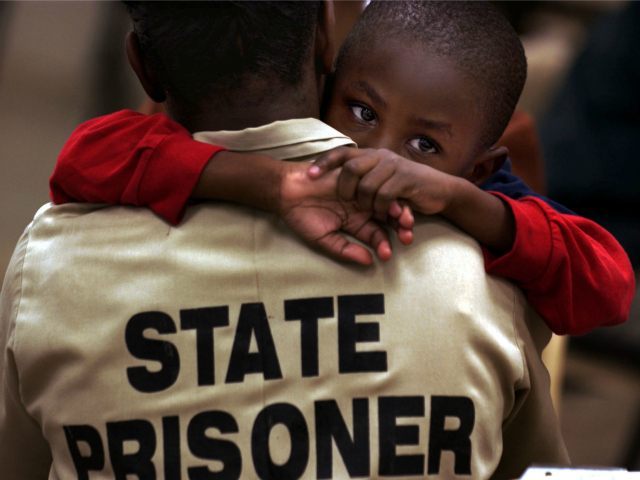Half of America’s children have a parent with a criminal record, creating many “barriers to opportunity” for parents and children, says the liberal Center for American Progress.
“Communities of color – and particularly, men of color – are hit hardest, with black men six times more likely and Latino men two-and-a-half times more likely to be incarcerated than white men,” states CAP.
The group’s new report estimates that from 33 to 36.5 million children up to age 18—or nearly half of American children—now have at least one parent with a criminal record, ranging from traffic misdemeanors to felony convictions.
According to the analysis, the number of Americans in federal and state prisons has multiplied five times over the past 40 years. CAP blames the high rate of criminality on “nearly four decades of mass incarceration and overcriminalization… which has resulted in overwhelming rates of poverty, unemployment, and lack of education.” Between 70 and 100 million Americans—some one in three American adults—have a criminal record, the report says.
CAP continues:
While the effects of parental incarceration on children and families are well-documented, less appreciated are the family consequences that stem from the barriers associated with having a criminal record, whether or not the parent has ever been convicted or spent time behind bars. A child’s life chances are strongly tied to his or her circumstances during childhood. Thus, these barriers may not only affect family stability and economic security in the short term but also may damage a child’s long-term well-being and outcomes.
The organization suggests a “new framework for family policy” it calls “the three S’s.”
These are family strength, the quality of the parents’ relationships with each other and with their children; family structure, the members that make up the family; and family stability, the extent of change among family members and in the quality of relationships over time.
For example, regarding family structure, lower-income men living in cities are less likely to marry, the report says. CAP asserts the trend long-term is that “higher levels of inequality” are “being associated with a decline in marriage among men and women over time,” leading to greater family instability.
CAP’s recommendations to remove barriers for parents with criminal records include both Obama administration “rules” as well as passage of federal laws by Congress.
For example, the organization would like individuals with criminal records for non-violent crimes to be able to earn a “clean slate” with automatic sealing of their records after a period of time. The rule would help federal agencies or federal contractors hire individuals with criminal records, says CAP.
Also, CAP believes “guidance” issued jointly by the Department of Justice and the Consumer Financial Protection Bureau would encourage states and local governments to alter rules for the collection of criminal-justice debt. The group would like to see statutes of limitation on debts, “writing off uncollectible debt,” and waiving fees after incarcerated individuals complete re-entry programs.
Barriers to government-subsidized housing for individuals with criminal records could be removed if assessments were performed on an individual basis and local public housing authorities adopted the Department of Housing and Urban Development (HUD) guidance for best practices, CAP said.
The organization also urges the removal of the lifetime ban on the American Opportunity Tax Credit for people with felony drug convictions who want to attend college.
In addition, CAP recommends Congress allow incarcerated individuals full access to Pell Grants, and a rollback in barriers to college entry for those with criminal histories, except for criminals who may be dangerous.
The report, however, diminishes the importance of fathers and of marriage. “While the most sophisticated reviews of social science conducted to date suggest that the causal effects of a father’s absence alone on child well-being are likely modest, there is little debate that both children and adults would benefit from stronger, more stable marriages and committed relationships,” the report claims, while linking to a prior CAP report.

COMMENTS
Please let us know if you're having issues with commenting.